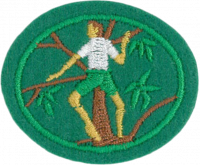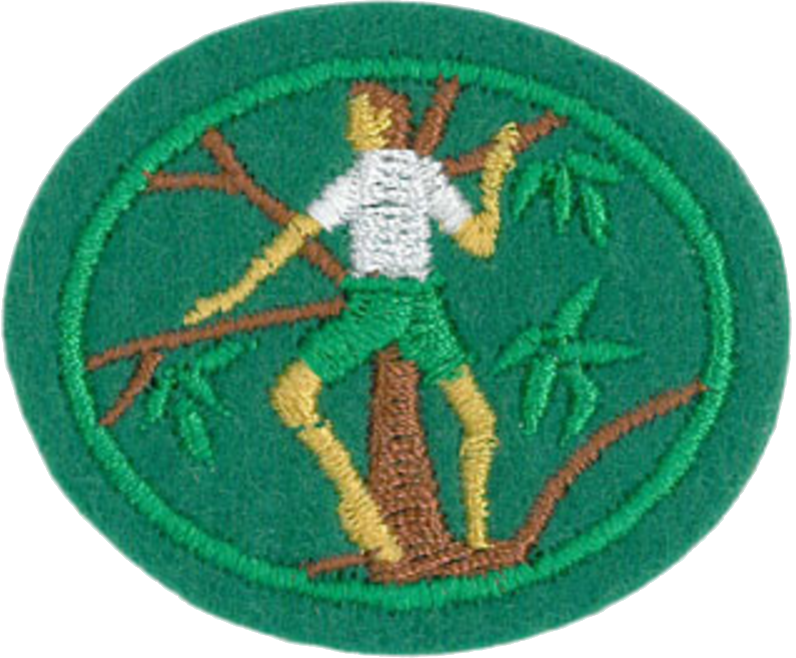Difference between revisions of "AY Honors/Tree Climbing/Answer Key"
Jomegat bot (talk | contribs) (Bot: Automated import of articles *** existing text overwritten ***) |
m (- Category of AYHAB) |
||
| (One intermediate revision by the same user not shown) | |||
| Line 4: | Line 4: | ||
<noinclude><translate><!--T:12--> | <noinclude><translate><!--T:12--> | ||
</noinclude> | </noinclude> | ||
| − | <!-- 1. Practice your tree climbing skills a number of times on a 10-15 foot tree. | + | <!-- 1. Practice your tree climbing skills a number of times on a 10-15 foot tree. --> |
| − | Climbing coconut trees is a time honored skill in the tropics. | + | Climbing coconut trees is a time honored skill in the tropics. It is the only way to get young coconuts which are highly nutritious and provide valuable liquids. In a survival situation, knowing how to climb trees could save your life! |
<!--T:3--> | <!--T:3--> | ||
| − | The obvious reason to practice on a 10-15 foot tree first is that it is not a long way to the ground if/when you fall. | + | The obvious reason to practice on a 10-15 foot tree first is that it is not a long way to the ground if/when you fall. Have fun! |
<!--T:13--> | <!--T:13--> | ||
| Line 16: | Line 16: | ||
<noinclude><translate><!--T:14--> | <noinclude><translate><!--T:14--> | ||
</noinclude> | </noinclude> | ||
| − | <!-- 2. Climb a 20-foot coconut tree. Demonstrate the manner of getting back down to the ground safely. | + | <!-- 2. Climb a 20-foot coconut tree. Demonstrate the manner of getting back down to the ground safely. --> |
<noinclude></translate></noinclude> | <noinclude></translate></noinclude> | ||
{{CloseReq}} <!-- 2 --> | {{CloseReq}} <!-- 2 --> | ||
| Line 41: | Line 41: | ||
<noinclude><translate><!--T:19--> | <noinclude><translate><!--T:19--> | ||
</noinclude> | </noinclude> | ||
| − | <!-- 4. The instructor should select trees suitable for climbing; one with lots of branches, the other a coconut tree. Each person must demonstrate on each of the two trees on how to apply the two | + | <!-- 4. The instructor should select trees suitable for climbing; one with lots of branches, the other a coconut tree. Each person must demonstrate on each of the two trees on how to apply the two methods of tree climbing (squat hopping and monkey type.) --> |
<noinclude></translate></noinclude> | <noinclude></translate></noinclude> | ||
{{CloseReq}} <!-- 4 --> | {{CloseReq}} <!-- 4 --> | ||
| Line 47: | Line 47: | ||
<noinclude><translate><!--T:20--> | <noinclude><translate><!--T:20--> | ||
</noinclude> | </noinclude> | ||
| − | <!-- 5. Demonstrate how you would safely carry a bush knife and an axe up a tree. | + | <!-- 5. Demonstrate how you would safely carry a bush knife and an axe up a tree. --> |
<!--T:6--> | <!--T:6--> | ||
| − | First, you DO NOT carry sharp objects up a tree. If you fall you will not be able to control the sharp object and you could kill yourself. | + | First, you DO NOT carry sharp objects up a tree. If you fall you will not be able to control the sharp object and you could kill yourself. Instead, tie a rope to the knife or axe and the other end of the rope to your wrist. Climb the tree. When you are safely situated at the top, use the rope to pull the knife/axe up to you. |
<!--T:7--> | <!--T:7--> | ||
| − | Don't climb down with sharp objects either. Lower the object with the rope before | + | Don't climb down with sharp objects either. Lower the object with the rope before descending yourself. |
<!--T:21--> | <!--T:21--> | ||
| Line 82: | Line 82: | ||
<noinclude><translate><!--T:26--> | <noinclude><translate><!--T:26--> | ||
</noinclude> | </noinclude> | ||
| − | <!-- 7. Know how to remove an injured person from a tree. | + | <!-- 7. Know how to remove an injured person from a tree. --> |
<noinclude></translate></noinclude> | <noinclude></translate></noinclude> | ||
{{CloseReq}} <!-- 7 --> | {{CloseReq}} <!-- 7 --> | ||
| Line 89: | Line 89: | ||
# http://www.caske2000.org/survival/coconutclimb.htm | # http://www.caske2000.org/survival/coconutclimb.htm | ||
<noinclude></translate></noinclude> | <noinclude></translate></noinclude> | ||
| − | |||
{{CloseHonorPage}} | {{CloseHonorPage}} | ||
Latest revision as of 00:06, 19 July 2022
1
Climbing coconut trees is a time honored skill in the tropics. It is the only way to get young coconuts which are highly nutritious and provide valuable liquids. In a survival situation, knowing how to climb trees could save your life!
The obvious reason to practice on a 10-15 foot tree first is that it is not a long way to the ground if/when you fall. Have fun!
2
3
3a
3b
See 3.a. answers.
4
5
First, you DO NOT carry sharp objects up a tree. If you fall you will not be able to control the sharp object and you could kill yourself. Instead, tie a rope to the knife or axe and the other end of the rope to your wrist. Climb the tree. When you are safely situated at the top, use the rope to pull the knife/axe up to you.
Don't climb down with sharp objects either. Lower the object with the rope before descending yourself.
6
6a
6b
While securely at the crown of the tree (standing in the crown or using one arm to support yourself) twist the coconut until it comes off.
7


